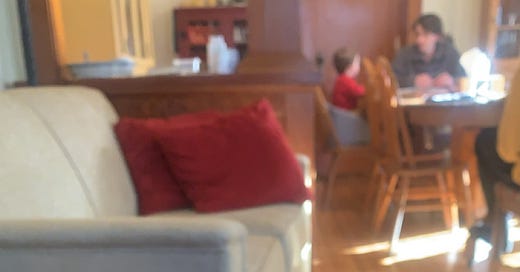This post was originally shared on Ellie’s personal substack, a humble and silky life, which she has begun to use as a sort of online diary in homage to the blogs of her childhood.
Our lives in 2025 have, simply put, been a permanent upheaval. In January, we met with realtors to discuss selling our house, by the first week of February, we had ripped up the flooring in the kitchen to replace, and had drywalled walls, sanded stairs, and finished up all the house projects we’d been in the midst of for years. Now, at the beginning of March, we’ve already accepted an offer on the house, moved into my parents’ basement, and are working on packing and moving all of our belongings to storage. Next month, we get to welcome a new baby, celebrate my birthday and Easter, and (God willing), figure out where we will move to this summer.
It has not been calm. If you had told me that what I needed was to read a book about how living virtuously entails self-sacrifice, being unlucky, and denying yourself all your favorite comforts, I would have laughed. “I need more of my favorite comforts—I’m absurdly pregnant, living in someone else’s home, I just sold a home I loved, and I don’t know where this next year will take me.”
My parents have arranged their living room to have two arm chairs underneath their windows, each with a bookshelf next to it. One is my mother’s chair, and my mother’s bookshelf, and the other is my father’s chair and my father’s bookshelf. Each have probably thirty books that they’re currently reading, about to read, have just finished, or have set aside partially through, all lined up neatly in two rows. Since I was sitting in my dad’s chair, drinking coffee, I looked over his bookshelf and grabbed How to Be Unlucky off the bottom left corner.
John and I have always been fans of Joshua Gibbs: John has listened to every Proverbial podcast ever recorded, and I read his articles whenever they are published on the Circe Institute’s blog. When I taught at a classical school in 2021, I read his book Something They Will Not Forget and it revolutionized how I viewed the daily discipline of teaching (and learning) anything. How to Be Unlucky, although on our shelves at home, had so far avoided my time, however.
The purpose of the book is to reflect upon virtue, guided by Lady Philosophy from Boethius’ The Consolation of Philosophy (a book that Gibbs followers will know is one he references almost constantly). Boethius is taught the true nature of virtue and a virtuous life by Lady Philosophy while he is bemoaning his life and the unfair hardships he has had to endure. Hardships which, we quickly learn, are not unfair or even that hard in general. Does that sound familiar? It did to overly pregnant, homeless, ‘comfortless’ Ellie.
As Gibbs wisely points out, our misfortunes and miseries are just the direct result of our own sinfulness, and if we want to be less miserable, we should pursue virtue, rather than comfort or relief from those misfortunes and miseries. If we comfort ourselves in times of trial by giving ourselves more of our pet comforts (an extra pastry or coffee to get through the day, a new beauty product we don’t need, an extra cocktail after supper), we are feeding our own personal idols and, eventually, making our own lives worse.
If we cannot deny ourselves our routine comforts as recognition that we do NOT deserve them, we become slaves to them, as silly as they may be. This was put in a way I really needed to hear. John and I have often discussed how hard it is for me to go out without buying myself a coffee, and I needed to hear Gibbs express that this is because I made it an idol accidentally. When I worked as an admissions counselor, my work paid for my food while traveling, so I was able to buy coffee for free every day. For multiple years, I worked at various coffee shops where I got beautiful, high quality coffee for free every day on shift.
How could I know then the expense that habit would inflict on us when I did not have access to those free coffees and had to start paying for them every time I went out? Gibbs suggests that the only way we can work against these vices is to actively pursue the virtues and practice self sacrifice so that we are less likely to fall into them. There is nothing wrong with me loving good coffee, or buying it for myself, but it is wrong to never deny myself that desire. The more you give in to your desires, the less they satisfy you, and the more control they have over you.
I won’t attempt to summarize all the goodness in How to Be Unlucky, at least not in this one post, but I have been ruminating on it ever since I picked it up this weekend, and it sufficiently condemned me and called me to repentance and the pursuit of virtue again, just in time for Lent. I may not live on acres of land overlooking a river, with perfect health, no pain, and unlimited coffee, but I need none of those things. In fact, what I seem to need is a fast from all of them, and I’ve gotten it.
What a Lenten fast this will be.





Ellie, I know you so I trust the viewpoint you are coming from. However I was just at a Baptist church that had a very long sermon on virtue and Jesus was not mentioned once. My earthly virtue may lead to good things on this earth, and it may not, but what I really want is what The Word gives.
And you should've rented out my little studio again (smiley face)